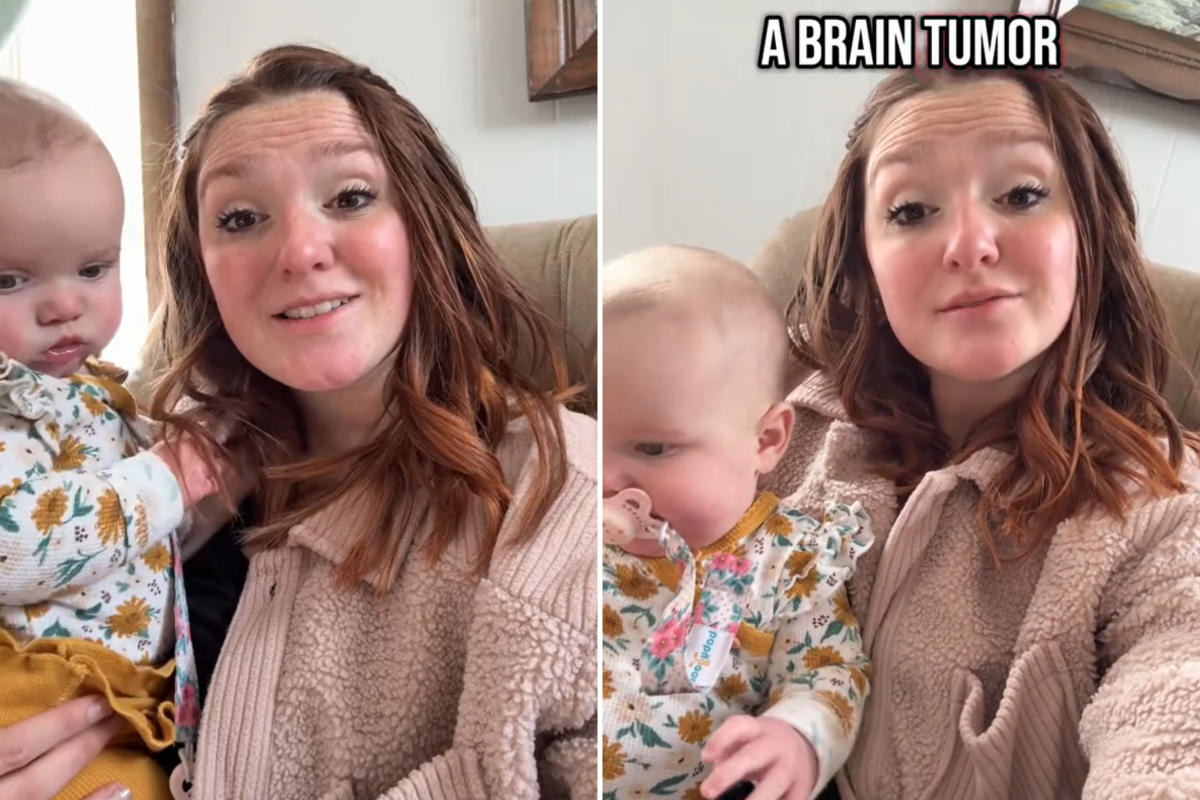New Hampshire mom’s “migraines” were actually a brain tumor: A story of misdiagnosis.
Susan Ash (25-year-old New Hampshire mom) dismissed her headaches that were getting worse and the visual disturbances she was experiencing as postpartum. But, Susan Ash never realized they were symptoms of a brain tumor. Here is the story of her journey through a tough diagnosis, and how she became an advocate for other women.
Susan began to experience symptoms around the age of 10, when she was diagnosed with what doctors called ocular migraines. The episodes lasted for many years, but then resurfaced intensely two weeks after the birth of her daughter.

Susan remembers that the first weeks of a baby’s life are exhausting, frightening and full of learning. “I thought it was ocular headaches because I had to adjust to becoming a mom.” Add to this confusion mood changes attributed to hormonal fluctuations postpartum. Although, the subtle changes in color and brightness when viewing screens (especially white) or biting on her cheeks while asleep were indicators that seizures had begun.
Susan brought up her “migraines” during a postpartum routine checkup. Susan’s primary physician ordered magnesium supplements and recommended that she be referred to a neurology specialist.
It seemed that the magnesium was able to reduce visual impairments. Susan explained that she was having only a few headaches a week, compared with almost 20. But it improved only with magnesium as that helps with seizures and migraines.
Susan decided to cancel the appointment because she felt a little better, and was worried that her work leave would be extended.
# A Life-Changing and Frightening Diagnosis
Susan’s condition took a drastic turn on the 18th of October. At a soccer tournament, she had a grand-mal seizure. Her brother-in law recognized the symptoms and immediately called for medical help.
Susan recalls, “When I opened up my eyes I was sitting in an ambulance in the rear with an IV in one arm.” “I was confused, I didn’t understand. I assumed I’d been dehydrated and that I would be given a lecture.”
She underwent extensive tests, which included an MRI, CT scan, and contrast-enhanced CT, that revealed a 1.6 cm brain tumor in the left occipital lobe. Susan, then 24, was diagnosed at the age of 24 with a brain tumour and epilepsy.
It was a surreal experience. “It was ‘like the movies’ because the room around her became blurry and she couldn’t focus on what he was saying” she stated. Her first fear was that she would leave her daughter alone.
Dr. Heather Hinshelwood of The Fraum Center for Restorative Health in emergency medicine emphasizes the fact that tumors with slow growth can be easily overlooked. The importance of being able to identify warning signs is highlighted.
Dr. Hinshelwood outlines the criteria that may indicate a brain tumour:
- Neuropathic deficits of new onset (weaknesses, imbalance, visual changes, numbness of part of body).
- Thunderclap Headache, the most severe headache that can occur suddenly
- Strange personality changes
- Headaches that started some time ago have gotten worse
- You suspect that a patient would not complain of headaches unless there was a serious problem.
- My intuition tells me that something is not right, even if there are no obvious signs
- New onset seizure
Susan’s doctors believe she may have been living with the tumour unknowingly for more than a decade or even from birth. Later, when asked about cheek biting, Susan initially dismissed it, only to realize she frequently experienced canker sores from unknowingly biting her cheeks in her sleep – a subtle symptom of seizure activity she had overlooked for years.
Susan currently manages seizures using medication. The tumor is also monitored regularly with scans. Treatment plan is still uncertain. Doctors are debating surgical removal or the possibility of permanent visual impairment.
Sharing her Journey on Social Media and Empowering others
Susan bravely shared her story on platforms such as Instagram and TikTok. She sought information and advice from other people who shared similar experiences. After discovering a lack of content on the subject, she decided to be a voice for other people.
Her videos discuss everything from early symptoms of brain tumors to CT scan results The challenges she faces with her epilepsy, and side effects from epilepsy medications.
Susan frequently reflects on the fact that, if videos had been available earlier describing the subtle symptoms of a tumor in her brain she may not have cancelled an appointment with a neurologist.
Susan says, “A brain tumor and a baby were not in my bingo 2024 card. But my daughter was the light of my darkest times.” Being a first-time mom can be difficult, but having a brain tumour has made me slow down and enjoy every moment.
Susan shares her story not in order to create fear, but in order to make others aware of symptoms they may have overlooked and encourage them to be advocates for their health. Her hope is that her story can assist other women and new mothers to recognize warning signs early and get medical care.
“Take the time to see your doctors, use time off or go unpaid—believe me, I know that is easier said than done,” Susan urges. Because I was so focused on my work, I missed the diagnosis of a brain tumour. The experience of this New Hampshire mom serves as an important reminder to prioritise our health, and trust our intuition when we feel something is not right. To detect early, it is important to seek a comprehensive neurological assessment for persistent symptoms.
***


